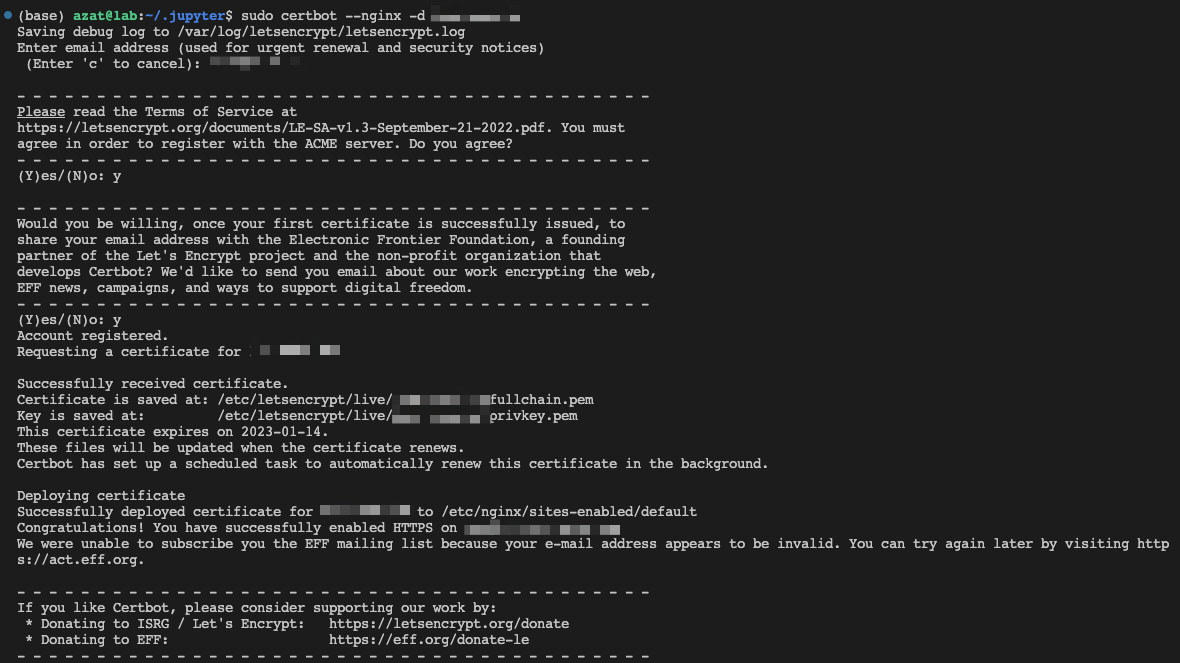
Using Docker Compose
Prepare folders
mkdir -p ~/jupyter && cd ~/jupyter
touch docker-compose.yml
mkdir -p data
mkdir -p configurations
Edit Docker Compose File
version: '3'
services:
jupyter:
image: jupyter/datascience-notebook:latest
container_name: jupyter
volumes:
- ./data:/home/azat/
- ./configurations:/home/azat/.jupyter
ports:
- 8888:8888
restart: always
labels:
- "traefik.enable=true"
- "traefik.docker.network=proxy"
- "traefik.http.routers.jupyter-secure.entrypoints=websecure"
- "traefik.http.routers.jupyter-secure.rule=Host(`lab.azat.host`)"
- "traefik.http.routers.jupyter-secure.service=jupyter-service"
- "traefik.http.services.jupyter-service.loadbalancer.server.port=8888"
networks:
- proxy
user: root
command: "start-notebook.sh"
environment:
NB_USER: azat
NB_UID: 1001
NG_GID: 1001
CHOWN_HOME: 'yes'
CHOWN_HOME_OPTS: -R
GRANT_SUDO: 'yes'
RESTARTABLE: 'yes'
networks:
proxy:
external: true
Run the docker compose
docker compose up -d
Setup the Jupyter password
docker compose run --rm jupyter bash
jupyter server password

mv /home/jovyan/.jupyter/jupyter_server_config.json /home/azat/.jupyter/jupyter_server_config.json && exit
sudo chown -R azat:azat ./configurations
and restart the jupyter docker compose.
docker compose restart

Notice: this should take some time.
Installing other kernels
from the jupyter online terminal:
mamba install xeus-cling notebook -c QuantStack -c conda-forge
mamba install -c conda-forge ipydrawio
Bare Metal
Prepare installation
sudo apt-get update --yes && \
sudo apt-get install --yes --no-install-recommends \
fonts-dejavu \
gfortran \
gcc && \
sudo apt-get clean && sudo rm -rf /var/lib/apt/lists/*
Install Miniforge
wget "https://github.com/conda-forge/miniforge/releases/latest/download/Mambaforge-$(uname)-$(uname -m).sh"
bash Mambaforge-$(uname)-$(uname -m).sh
Install Mamba
conda install mamba -n base -c conda-forge
Install Nodejs and Jupyter Lab
mamba install -c conda-forge nodejs
mamba install -c conda-forge jupyterlab
Generate Jupyter Server Config
jupyter server --generate-config

jupyter server password

Setup the Jupyter Server
mkdir -p /home/azat/jupyter
code ~/.jupyter
Edit jupyter_server_config.py
# Configuration file for jupyter-server.
c = get_config() # noqa
# Azat
# c.ServerApp.ip = '*'
c.ServerApp.allow_origin = '*'
c.ServerApp.port = 8888
c.ServerApp.open_browser = False
c.ServerApp.allow_remote_access = True
c.ServerApp.root_dir = '/home/azat/jupyter'
c.ServerApp.quit_button = False
# Azat
Run the Jupyter Server

Install Certbot and Generate SSL Keys
sudo snap install core; sudo snap refresh core
sudo snap install --classic certbot
sudo ln -s /snap/bin/certbot /usr/bin/certbot
Generate SSL certificate for domain name
sudo certbot --nginx -d <DOMAIN>

Setup Nginx
sudo apt install nginx -y
create file /home/azat/.jupyter/jupyter.conf
# top-level http config for websocket headers
# If Upgrade is defined, Connection = upgrade
# If Upgrade is empty, Connection = close
map $http_upgrade $connection_upgrade {
default upgrade;
'' close;
}
# HTTP server to redirect all 80 traffic to SSL/HTTPS
server {
listen 80;
server_name <domain>;
# Tell all requests to port 80 to be 302 redirected to HTTPS
return 302 https://$host$request_uri;
}
# HTTPS server to handle JupyterHub
server {
listen 443 ssl;
server_name <domain>;
ssl_certificate /etc/letsencrypt/live/lab.azat.host/fullchain.pem;
ssl_certificate_key /etc/letsencrypt/live/lab.azat.host/privkey.pem;
ssl_protocols TLSv1 TLSv1.1 TLSv1.2;
ssl_prefer_server_ciphers on;
ssl_ciphers 'ECDHE-RSA-AES128-GCM-SHA256:ECDHE-ECDSA-AES128-GCM-SHA256:ECDHE-RSA-AES256-GCM-SHA384:ECDHE-ECDSA-AES256-GCM-SHA384:DHE-RSA-AES128-GCM- SHA256:DHE-DSS-AES128-GCM-SHA256:kEDH+AESGCM:ECDHE-RSA-AES128-SHA256:ECDHE-ECDSA-AES128-SHA256:ECDHE-RSA-AES128-SHA:ECDHE-ECDSA-AES128-SHA:ECDHE-RSA-AES256-SHA384:ECDHE-ECDSA-AES256-SHA384:ECDHE-RSA-AES256-SHA:ECDHE-ECDSA-AES256-SHA:DHE-RSA-AES128-SHA256:DHE-RSA-AES128-SHA:DHE-DSS-AES128-SHA256:DHE-RSA-AES256-SHA256:DHE-DSS-AES256-SHA:DHE-RSA-AES256-SHA:AES128-GCM-SHA256:AES256-GCM-SHA384:AES128-SHA256:AES256-SHA256:AES128-SHA:AES256-SHA:AES:CAMELLIA:DES-CBC3-SHA:!aNULL:!eNULL:!EXPORT:!DES:!RC4:!MD5:!PSK:!aECDH:!EDH-DSS-DES-CBC3-SHA:!EDH-RSA-DES-CBC3-SHA:!KRB5-DES-CBC3-SHA';
ssl_session_timeout 1d;
ssl_session_cache shared:SSL:50m;
ssl_stapling on;
ssl_stapling_verify on;
add_header Strict-Transport-Security max-age=15768000;
# Managing literal requests to the JupyterHub front end
location / {
proxy_pass http://127.0.0.1:8888;
proxy_set_header X-Real-IP $remote_addr;
proxy_set_header Host $host;
proxy_set_header X-Forwarded-For $proxy_add_x_forwarded_for;
# websocket headers
proxy_http_version 1.1;
proxy_set_header Upgrade $http_upgrade;
proxy_set_header Connection $connection_upgrade;
proxy_set_header X-Scheme $scheme;
proxy_buffering off;
}
# Managing requests to verify letsencrypt host
location ~ /.well-known {
allow all;
}
}
Setup the systemd
edit /home/azat/.jupyter/jupyter.service
[Unit]
Description=Jupyter Lab
After=network.target
StartLimitIntervalSec=0
[Service]
Type=simple
Restart=always
RestartSec=1
User=azat
WorkingDirectory=/home/azat/Jupyter
ExecStart=/home/azat/mambaforge/bin/jupyter lab
[Install]
WantedBy=multi-user.target
sudo cp ./jupyter.service /etc/systemd/system
sudo systemctl daemon-reload
sudo systemctl enable jupyter
sudo systemctl restart jupyter
sudo journalctl -u jupyter
Bug Fix
Jupyter Resources 404 .


Solution: Turn off Rocket Loader from Cloud Flare.
PREVIOUSA Swift Tour
NEXT图解 HTTP (书)